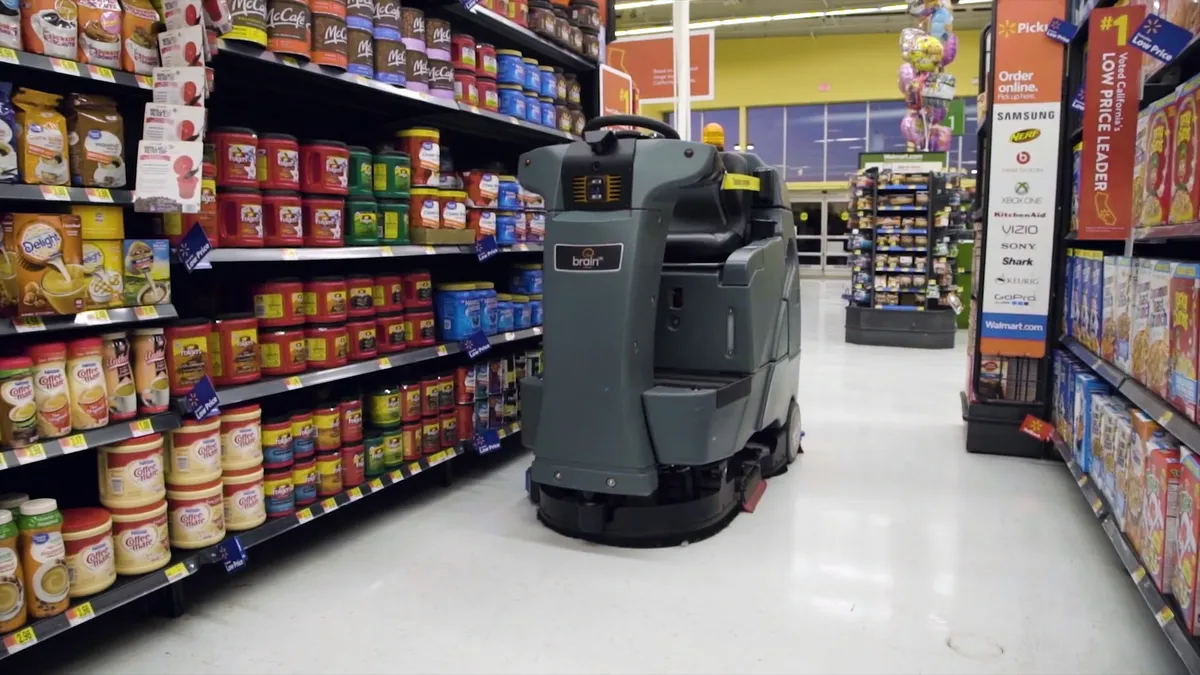Dive Brief:
- Walmart is rolling out 360 autonomous, floor-scrubbing robots to select stores nationwide by the end of January, according to a joint statement with Brain Corp, which makes the artificial intelligence that powers the machines.
- The machines must be operated by humans first to teach them the layout of the area that needs to be cleaned before the tasks can be performed autonomously. The robot’s sensors will scan the area for people and obstacles so it can be operated safely in crowded environments.
- The machines aren’t Walmart’s first foray into automation. The retailer has already been experimenting with robots that scan shelves for out-of-stock or incorrectly priced items. These robots have sensors to collect information about inventory on store shelves, leaving staff with more time to provide customer service and other higher level tasks.
Dive Insight:
Walmart has been consistently incorporating new technology into its stores and online. Last year the retailer started testing shelf-scanning robots that check inventory levels and pricing and look for misplaced items. There are now 100 machines already operating inside Walmart stores.
Walmart has been careful to note that automated technology like this is freeing employees from mundane tasks and allowing them to focus on customer service. To this end, the company has also introduced technology to empower workers, like a new in-store app gives associates access to Walmart.com. If a store is sold out of a product, customers can turn to associates for help finding and ordering the right product online, allowing customers to pay with cash, check, credit card or Walmart Pay. Earlier this year, Walmart launched a suite of apps that allow associates to manage a variety of tasks and services.
Some experts, however, are convinced automation will have a significant impact on retail labor forces, in particular labor-intensive jobs.
"This is part of a much broader trend in which many of the frontline and operational staff in the retail sector are going to be dis-intermediated by technologies such as artificial intelligence and robotics," Doug Stephens, founder and president of Retail Prophet told Retail Dive in an email. "Inventory management, janitorial, checkout, customer service and even some routine management activities are rapidly migrating to technology. Essentially if your work is either physically or cognitively repetitive, you can rest assured someone is developing a technology to do that work."
In fact, there's a 92% probability that "vast numbers" of retail salespeople will be displaced by technology by 2023, Stephens said, citing a 2013 Oxford University study.
Walmart is hardly alone in the move toward automation. Amazon uses hundreds of robots to fill orders in its distribution centers and already has checkout free stores. Midwest-based Schnucks introduced a front-of-store robot last year to scan for low inventory and pricing errors. Giant and Food Lion rolled out “Marty,” a googly-eyed shelf-scanning robot, in a small number of stores last year for the same tasks. Ahold Delhaize is investing in technology in partnership with the Netherlands-based Delft Institute of Technology to find ways to bring robotics into its retail stores.
According to a McKinsey report, between 400 and 800 million jobs could be displaced by 2030 due to automation. In the meantime, Walmart and other stores need to make sure the new employees don’t take away from the shopping experience for their human customers.












